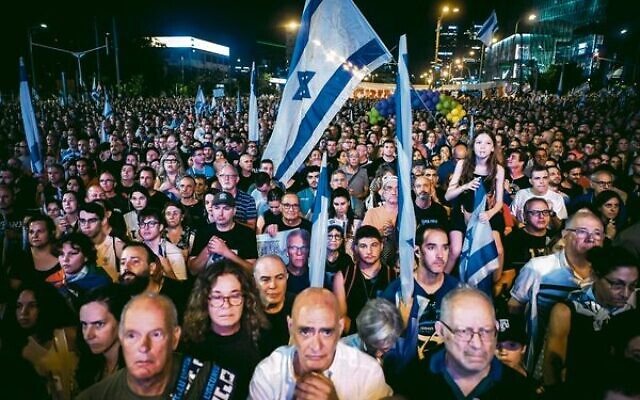22nd week of protests as negotiations continue
Outlets estimated that between 95,000 and 140,000 people attended the main rally in Tel Aviv, alongside thousands of others in some 150 locations around the country.
(Times of Israel) – Weekly protests against the government’s proposed judicial overhaul enjoyed a slightly increased turnout last Saturday, with the rallies boosted by renewed anger at police over a forceful crackdown on a Friday night protest near Prime Minister Benjamin Netanyahu’s private residence, and at key overhaul architect Simcha Rothman for snatching a megaphone from a protester during a visit to the United States.
Various Hebrew media outlets estimated that between 95,000 and 140,000 people attended the main rally in Tel Aviv, alongside thousands of others in some 150 locations around the country, kicking off the 22nd week of protests against the now-paused plan.
Many of the demonstrations began with a silent commemoration for three Israeli soldiers killed earlier in the day in a shooting on the border by an Egyptian policeman, who was later shot dead.
The continued demonstrations come a week after Netanyahu said the contentious plan to revamp the judiciary would now return to the legislative agenda after the passage of the state budget.
The judicial overhaul legislation has been frozen since late March, when Netanyahu said he would halt the plans to allow for talks with the opposition under the auspices of President Isaac Herzog, aimed at finding a broadly accepted compromise for judicial reform.
But months of talks have not produced a breakthrough, and pressure has increased within the coalition to resume the legislative push.
Reports however continue to swirl that the coalition and opposition are inching toward announcing areas of agreement regarding the judicial reform. In particular, the parties are said to be converging on a set of principles governing the continuation of talks, as well as on limiting judicial review of the “reasonableness” of government decisions and permitting the government to select its own legal advisers, rather than be forced to rely upon the Attorney-General’s Office.
Opposition sources continue to deny that they would sign onto a piecemeal agreement, instead demanding guarantees that the coalition bury its sweeping plan to sap the judiciary of its power as a condition to any agreement.
Meanwhile, two days out from the June 7 deadline to submit candidates, opposition parties have yet to reach an agreement on a candidate to put on Israel’s Judicial Selection Committee, endangering the camp’s ability to have a say in crucial bench appointments.
On June 14, lawmakers will cast secret ballots to choose the Knesset’s two representatives to the panel, which is entrusted with selecting Israel’s judges from the Supreme Court on down. The coalition and opposition usually split those two seats.
However, the coalition has threatened to advance two candidates of its own. Coupled with the lack of a consensus candidate from the opposition, the result could wind up leaving the opposition without any influence over the discussions.
Opposition Leader Yair Lapid said on Monday that “efforts are being made with [National Unity head Benny] Gantz to come to an agreed-upon candidate”.
Last week, Lapid and Gantz met to discuss the appointment, after publicly blaming each other for mismanaging the process and endangering the opposition’s seat.


comments